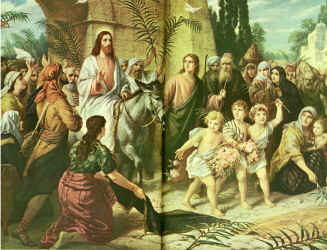 The Sunday before Easter is known in the Christian world as Palm Sunday. It marks the return of Jesus Christ into Jerusalem exactly one week before his resurrection, and Christians use Palm Sunday to begin the holiest week of their year, which culminates on Easter Sunday. Thusly, Palm Sunday is the Sunday prior to whichever Sunday is designated as Easter Sunday.
The Sunday before Easter is known in the Christian world as Palm Sunday. It marks the return of Jesus Christ into Jerusalem exactly one week before his resurrection, and Christians use Palm Sunday to begin the holiest week of their year, which culminates on Easter Sunday. Thusly, Palm Sunday is the Sunday prior to whichever Sunday is designated as Easter Sunday.
The four gospels in the Bible describe how Christ and his disciples returned to Jerusalem for the Jewish feast of Passover. According to the Bible, Christ entered the city of Jerusalem riding a donkey, therefore fulfilling a prophecy about the Messiah’s arrival. Crowds of people lined the path he rode, laying down their cloaks in the street in front of him. They also placed palm branches before him-a gesture reserved for only the most honored. They sang praises to Christ, including in those praises “Hosannah,” which means “save us now.”
From at least the fourth century A.D., faithful Christians all over the world have celebrated Palm Sunday in different ways. Many churches pass out to congregation members cut palm leaves or other seasonal branches. Before palm leaves were easily imported, some of the more temperate countries used branches of yew, box, hazel, willow and even daffodils, which are nicknamed Lent Lilies. Other churches participate in a procession, during which bearers carry palm branches congregation members hold a pageant to reenact Christ’s trial and crucifixion. Still other denominations hold a special sermon and sing the appropriate hymns to usher in the start of the Holy Week.
No matter where or how Palm Sunday is being celebrated, each congregation has maintained unique traditions in order to commemorate the special day. In Spain, people cut palm leaves and dry them. Then they are woven into intricate shapes including crosses to use for decoration. In Latvia, the day is known as Pussy Willow Sunday and pussy willow branches, symbolizing rebirth, are handed out to faithful members. In the Netherlands, there are often large processions of faithful members carrying oil lamps. Polish Christians hold artificial palm competitions. In England, some churches make pax cakes, which are symbolic of good will, and these are given to the members as they leave the Sunday service.
In Jerusalem itself, massive crowds attend Palm Sunday celebrations. Starting from the Mount of Olives, participants walk down to the city waiving palm branches, while others re-create the crowd that greeted Christ as he entered Jerusalem.


